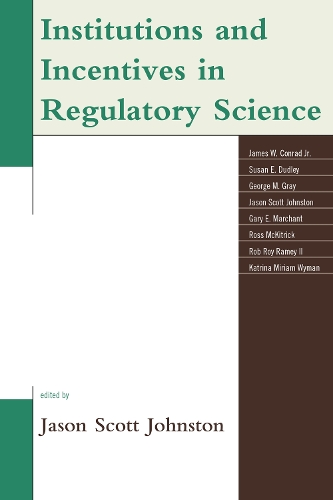
Institutions and Incentives in Regulatory Science
(Paperback)
Publishing Details
Institutions and Incentives in Regulatory Science
By (Author) Jason Scott Johnston
Contributions by James W. Conrad
Contributions by Susan Dudley
Contributions by George M. Gray
Contributions by Gary Marchant
Contributions by Ross McKitrick
Contributions by Rob Roy Ramey
Contributions by Katrina Wyman
Bloomsbury Publishing PLC
Lexington Books
10th December 2013
United States
Classifications
Professional and Scholarly
Non Fiction
Central / national / federal government policies
Political economy
Applied ecology
351.73
Physical Properties
Paperback
232
Width 151mm, Height 225mm, Spine 17mm
354g
Description
Institutions and Incentives in Regulatory Science explores fundamental problems with regulatory science in the environmental and natural resource law field. Each chapter covers a variety of natural resource and regulatory areas, ranging from climate change to endangered species protection and traditional health-based environmental regulation. Regulatory laws and institutions themselves strongly influence the direction of scientific research by creating a system of rewards and penalties for science. As a consequence, regulatory laws or institutions that are designed naively end up incentivizing scientists to generate and then publish only those results that further the substantive regulatory goals preferred by the scientists. By relying so heavily on science to dictate policy, regulatory laws and institutions encourage scientists to use their assessment of the state of the science to further their own preferred scientific and regulatory policy agendas. Additionally, many environmental and natural resource regulatory agencies have been instructed by legislatures to rely heavily upon science in their rulemaking. In areas of rapidly evolving science, regulatory agencies are inevitably looking for scientific consensus prematurely, before the scientific process has worked through competing hypotheses and evidence. The contributors in this volume address how institutions for regulatory science should be designed in light of the inevitable misfit between the political or legal demand for regulatory action and the actual state of evolving scientific knowledge.
Reviews
Institutions and Incentives in Regulatory Science is essential reading for people interested in how institutions affect regulatory agencies abilities to make decisions based on objective interpretations of scientific evidence of risks to health, safety or the environment. -- Randall Lutter, Resources for the Future
A powerful and disturbing account of the biases and uncertainties in regulatory science. Fortunately, the authors offer promising reforms to buttress the integrity of science in the midst of the politics of rulemaking. -- John D. Graham, Dean, School of Public and Environmental Affairs, Indiana University
Provocative and timely, Institutions and Incentives in Regulatory Science raises crucial questions for anyone interested in science and public policy. In the abstract, everyone agrees that legitimate policy making depends on both credible science as well as on political and moral judgment. But in practice, as the cases in this book engagingly show, the challenge lies in discerning the appropriate roles for science and politicsand then keeping each in their respective places. Few challenges are more central to contemporary regulatory policy over matters as varied as climate change, biodiversity, and toxic pollution. -- Cary Coglianese, University of Pennsylvania
Author Bio
Jason Scott Johnston is the Henry L. and Grace Doherty Charitable Foundation Professor of Law and the Nicholas E. Chimicles Research Professor in Business Law and Regulation, University of Virginia School of Law.
